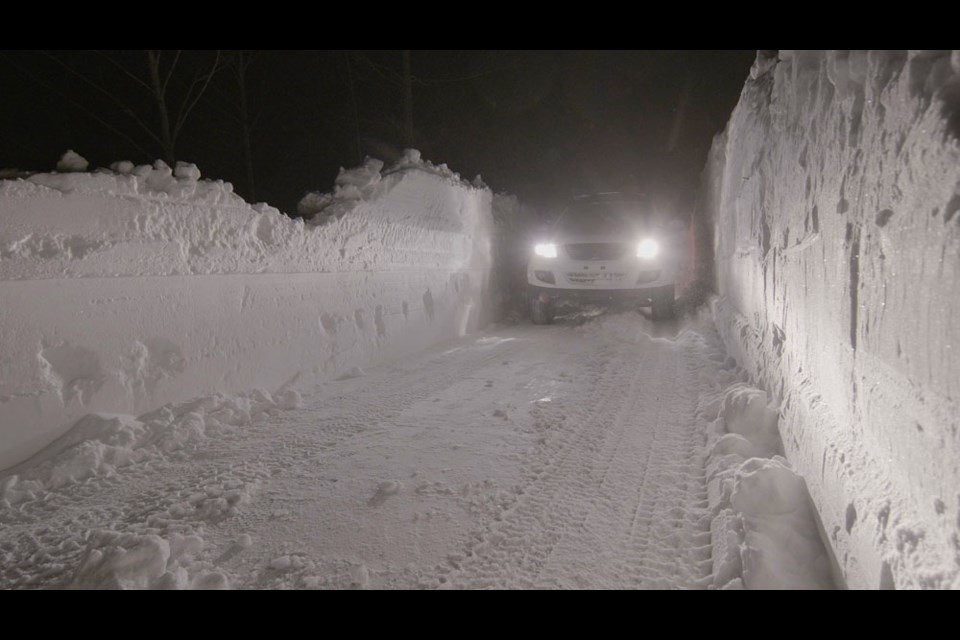After months of research into what they would need to shoot a ski documentary in rural China, the Squamish filmmakers did not anticipate the spread of the coronavirus that would see them monitored for symptoms.
Instead of leaving with the pilot of their Snow Hunters docu-series, Chris Winters and Brian Hockenstein, would leave just ahead of the mandatory quarantine — and with a different short film about their experience.
"We were prepared for many difficulties, both cultural and political, however, we had no contingency plan in place when there was a sudden outbreak of coronavirus," Chris Winters, the project's executive producer, said in a press release. "Once it became apparent that the outbreak was spreading quickly we decided as a team to abort the project early and find a way home to North America.
Winters and Hockenstein, who are both based in Squamish, were in the remote village of Kohm in the Altay Mountains when they decided to try to leave the country — but were trapped by a snowstorm.
Winters has been back in Squamish since Feb. 8, and The Chief spoke to him by phone on Feb. 12.
"Obviously, a lot of our objectives were cut short. We had to kind of make do with what we had, which is a shame for what we were trying to capture and the material we were trying to get. But, at the same time, we have a new story that is one connected with the virus," he said.
The filmmakers weren't held under quarantine necessarily, Winters said.
"What was happening in this small little village was happening everywhere around China, which is an amazing feat if you consider we were the furthest place that you pretty much could possibly be from Wuhan where the virus first spread. Granted, if anyone had come into the village with the virus, it would be catastrophic because there were no medical facilities for many, many hundreds of kilometres.
"The level of lockdown was pretty substantial," Winters said.
First, the Chinese New Year festival was postponed. The next day it was cancelled. Then, public spaces like restaurants were closed. Winters said the measures in the village may have been particularly enforced because of a visiting group of mainland Chinese tourists, some from Wuhan.
The filmmakers contacted a government official, who helped because they knew if they didn't get out of the village, they'd be forced to stay for weeks. The official came to the village to escort them out, but the road had seen multiple avalanches.
"Fortunately, I can say that from Squamish right now and not from a small little village," Winters said. "That would have been a tough month. It would be one thing if we could have continued filming and doing all of the other objectives that we had set out there to do, but they really wanted everyone inside their cabins with periodic temperature readings throughout the day."
Neighbouring villages helped with snow-blowing machinery, clearing between 30 and 50 kilometres just wide enough for their vehicles to pass through the snowdrifts. As they waited at the side of the road, huddled in the vehicle for warmth, Winters said they weren't sure they'd make it through. It was only as they drove through the cleared road that they realized how extensive the effort was. Winters said they hope other people looking to leave the village used the clearing, but said they might have been the last planning to leave the area.
After reading mostly negative media coverage of the health measures put in place in China, Winters wanted to share their experience.
"At least this little moment of what we saw in the whole experience, we have to give a lot of credit to at least the local authorities in China," he said.
The tendency of the Western media is to look at the Chinese lockdown as a breach of personal rights, Winters said.
"Having been there and having seen the immense amount of people moving around at that time of the year, I actually am now in support of all the measures that were taken against us, and taken in our benefit in the sense of getting us out in time. We were very fortunate that we had that kind of assistance.
"The fact that they announced it before the actual holiday meant that I think the spread of people was limited. The actual quarantine really did overlap almost exactly with the holiday, which a lot of families already have a kind of self-imposed quarantine..."
The production team had been planning to film a pilot episode of Snow Hunters this winter. Originally pitched to be about overconsumption and the ancient versus modern in the ski industry, the film may now weave in the coronavirus. Winters questions whether it is it better to be in a dense city, or rural area.
The pilot was intended to launch the full-series production next year. Although they don't think they have the full pilot yet, they did spend a day learning on traditional skis.
"The idea is still there. We just have to build ourselves back up emotionally, physically and just get everything back together before we can attack the next step," he said.
"We hope the best for, of course, all of China, but all the people that helped us and the people in the village. We plan to be back next year."
They detail their departure in a short film, Coronavirus Escape.



